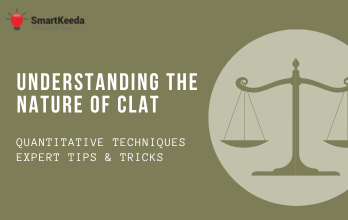
The CLAT, or Common Law Admission Test, holds immense significance as a pivotal step that every aspiring law student must successfully clear. Think of it as a substantial challenge that you need to conquer to unlock the doors leading to your desired law schools spread across the nation. With the forthcoming CLAT 2025 examination just around the corner, set to unfold in December, there is an air of anticipation, and we are fervently hoping that your preparations are in full swing.
However, the landscape of today's blog is venturing into unexplored terrain, as we set out to explore a topic that is both distinct and remarkably important. This topic revolves around a fundamental question: What lies beyond the horizon once you have triumphed over the CLAT exam? Gaining insight into these matters well in advance is of utmost significance. Thus, in this instance, were illuminating this very subject and embarking on a journey to uncover profound knowledge that you should arm yourselfwith while gearing up for the CLAT exam.
Visualize this blog as your guidebook, a companion for your journey. It is akin to a roadmap, expertly designed to assist you in navigating the path that unfurls after you have successfully conquered the CLAT. As we embark on this enlightening journey, we aim to provide you with guidance on how to strategically plan your trajectory within the realm of law once you have successfully passed the CLAT exam. So, with great excitement, lets immerse ourselves in this captivating exploration, peeling back the layers to reveal the strategic steps you should contemplate taking once you have emerged victorious from the CLAT challenge. With that, let us commence our journey through this enthralling blog.
Analyzing CLAT Results and Implications:
The CLAT result assumes a position of paramount importance for any aspiring law student, as it holds the power to shape their future trajectory. Numerous facets of their prospects are intricately intertwined with the score achieved in the CLAT exam. Consequently, a meticulous and thoughtful analysis of the CLAT result stands as a pivotal undertaking for aspiring legal scholars. This analysis is vital, as it is this score that will ultimately determine the hallowed halls of legal education they shall traverse, among myriad other considerations, From this website, you can see your CLAT Result (
consortiumofnlus.ac.in).
• Interpreting Your CLAT Score: The process of interpreting one's CLAT score necessitates a comprehensive understanding of the marking systems and their profound relevance to the selection process. The score obtained is not merely a collection of numbers accrued during the examination; rather, it is an evaluation of the candidate's performance across all sections of the CLAT exam.
Delving into an in-depth analysis of this score unveils the domains in which the candidate excels, while also shedding light on areas that needed improvement. It serves as a reflective tool to ascertain strengths and weaknesses encountered during the examination. Armed with this score and the subsequent interpretation and analysis thereof, candidates can arrive at an informed decision. They can weigh whether to embark on the admission process during the current year or contemplate repeating the examination, thus enabling a more judicious decision-making process.
• Identifying Strong Subject Areas: Guided by the insights gleaned from the comprehensive interpretation and analysis, candidates are poised to identify their areas of strength and weakness with
Mock tests. This introspection offers a window into sections wherein the candidate demonstrates exceptional prowes and those in which they grapple with the constraints of the examination timeframe. This process unravels whether their performance is matched with the efforts invested. Should the affirmative resound, it serves as a congratulatory milestone, signifying a harmonious alignment of preparation and performance.
• Researching Cut-Off Ranges for Preferred Institutions: After this profound introspection and considering the contemplation of one's candidature in law schools, a critical juncture presents itself. The first stride entails diligent research to unearth the estimated cut-off ranges for the preferred law schools. Additionally, it is important to delve into the annals of previous years, analyze the historical cut- off trends, and assimilate the experiential insights of past students regarding the preferred institution.
This comprehensive reconnaissance stands as an invaluable tool, substantively enriching the decision- making process.
Crafting a Targeted Application Strategy:
When setting out on the transformative journey of seeking admission to some of India,s most esteemed law schools, a glaring truth quickly comes to the fore—employing a one-size-fits-all approach to applications is fundamentally insufficient. Instead, the intricacies of the situation call for a more nuanced and discerning method, one characterized by the careful customization of the application process to fit the unique attributes and offerings of each law school. This strategic approach centers around the deliberate selection of specific law schools that align seamlessly with an individual's academic aspirations and future ambitions, fostering an intrinsic harmony between personal goals and institutional offerings.
In the intricate tapestry of legal academia, each law school boasts its distinct identity, woven from elements such as culture, values, academic prowess, reputation, faculty composition, and the intricate networks of its alumni. Consequently, the application process necessitates the meticulous and sagacious curation of one's choices, with a focus on law schools that deeply resonate with personal values and align harmoniously with the comprehensive array of opportunities they present. By meticulously adhering to this approach, an applicant not only articulates their dedication to an institution that encapsulates their ethos but also takes the initial steps towards an enriching educational voyage, embedding a seamless connection between personal interests and the institutional environment.
Within this strategic framework, a comprehensive exploration of the faculties and their diverse areas of expertise assumes a position of paramount importance. Engaging in conversations and dialogues with current students and alumni, facilitated through platforms like LinkedIn and other social media channels, emerges as an indispensable facet. Through these avenues, an applicant can gain invaluable insights into the vibrant tapestry of the law school, unraveling a multitude of perspectives that inform
their decision-making process.
Deeply delving into the diverse range of programs offered, immersing oneself in the contours of potential career pathways, and meticulously assessing the abundance of extracurricular opportunities—all these endeavors coalesce to provide the applicant with a detailed and informed understanding of the qualities that set each institution apart. This wellspring of informed perspective forms the foundation upon which informed decisions can be made, cultivating a strong emotional connection and profound sense of belonging with the chosen law school.
The pivotal significance ascribed to the applicant,s profile within this strategic trajectory cannot be overstated. A meticulous scrutiny of the own profile, encompassing a comprehensive evaluation of accomplishments, interests, and areas of expertise, emerges as the guiding star. This introspective journey facilitates the pinpointing of a specific niche within the expansive realm of law that resonates most deeply with the applicant's passion. This self-awareness, akin to a compass, empowers the applicant to embark on a purposeful journey of selecting law schools that serve as the canvas to paint their academic and professional aspirations. This, in turn, charts a trajectory toward an imminent future marked by academic fulfillment and professional
success.
Moreover, some law schools hold a strong emphasis on specific domains of legal discourse. For example, if a particular institution has forged a reputation for its dedication to human rights and social justice, boasting a plethora of relevant projects and courses, an applicant whose passions align with these causes can strategically tailor their application to align with this focus. Conversely, for those inclined towards the intricate realm of corporate law and business-related legal intricacies, a law school renowned for its expertise in this sphere emerges as the focal point of the application strategy. The meticulous alignment of personal inclinations with the unique strengths of each institution acts as the driving force propelling the applicant towards a transformative and comprehensive educational journey.
So, the quest for admission to distinguished Indian law schools mandates a comprehensive and meticulously planned strategic approach. The orchestration of tailor-made applications, calibrated to resonate with the distinctiveness of each law school, the harmonization of personal goals with institutional offerings, and the illumination of attributes that set the applicant apart in an exceptional manner collectively constitute the foundation of this strategy. This comprehensive approach, encompassing every facet of the strategic process, amplifies the potential for securing admission to the most suitable law school, serving as a stepping stone towards a future characterized by an academic journey of profound enrichment and a professional trajectory marked by distinction and prominence.
Decoding Financial Aid and Scholarship Opportunities:
When it comes to scholarships, there's a wide array of opportunities waiting to be explored. Each of these opportunities is like a tailor-made solution, designed to fit different situations and needs. Imagine a big treasure chest full of educational rewards, waiting for you to choose the one that fits you best. These scholarships are like puzzle pieces that come together to create a colorful picture of possibilities. Let's delve into these scholarship categories and understand them better:
Starting, we have the "Merit Scholarship". Think of this as a shining star in the sky of educational support. Many law schools recognize the hard work of exceptional students and reward them with these scholarships. It's like a pat on the back for those who've done exceptionally well in their studies. The call for this scholarship echoes those who've shown remarkable dedication in their educational journey. Their past achievements stand as proof of their commitment.
This scholarship is not just about being smart; it is about aiming for greatness. The combination of good grades, impressive test scores, and exciting extracurricular activities form a winning trio for this scholarship. And it's not just about recognition; this scolarship also lightens the load of tuition fees, making the dream of legal education more attainable.
Next up is the "Need-Based Scholarship". This scholarship comes to the rescue of students facing financial challenges. It's like a helping hand reaching out to those who might find it difficult to afford legal education. This program is all about fairness – it believes that anyone with talent and dreams should have the chance to study law, regardless of their financial situation. If family funds are tight, this scholarship steps in as a game-changer, making sure that dreams are not limited by money.
Diversity is a key ingredient in the recipe of education. Just like a colorful mosaic, different perspectives add depth to learning. This is where the "Diversity Scholarship" enters the scene. Just as a rainbow adds beauty to the sky, this scholarship celebrates the rich diversity of backgrounds and experiences that students bring to the legal field. It's not just about getting a scholarship; it's about celebrating the many stories that make up our society. By offering opportunities to underrepresented groups, this scholarship makes sure that the halls of legal education echo with a harmony of voices from various walks of life.
Venturing into the realm of exploration and discovery, we encounter the "Research Scholarships". These are like rewards for those who dare to dive deep into the sea of knowledge. If you're the curious sort, itching to uncover hidden truths, this scholarship might be your compass. It's all about encouraging you to explore uncharted territories in the world of law. Research scholarships also boost your innovative thinking, giving you the tools to question, investigate, and find answers. It's like a ticket to a journey of intellectual adventure, where you're supported in your quest to unravel the mysteries of the
legal world.
Imagine receiving an unexpected gift – that's what "Grants" are like. These are like little surprises that come with a touch of celebration. When you&'re chosen for a grant, it's as if your hard work is being applauded with a special treat. Grants come to the rescue when you need financial help with things like tuition, staying in a hostel, or working on a project. And the best part? You don't have to give the money back. It's like a golden opportunity to focus on your studies without worrying about expenses.
Lastly, there's the "Loan" A loan is like borrowing a helping hand when you need it the most. Just as you'd borrow a friend's bike for a ride, an educational loan helps you cover your educational expenses. But remember, loans come with a responsibility. You need to give back the money you borrowed along with a little extra called interest. It's like borrowing some money and agreeing to return it after a certain time. Before you sign any loan papers, make sure you understand all the rules and details.
In wrapping up this journey through scholarships, picture a beautiful landscape unfolding before you. Each scholarship category is like a different path you can take, each leading to a brighter future. Education is an adventure, and these scholarships are your map to success. They're like the stars guiding you in the night sky, showing you the way to a world of higher learning. By choosing the right scholarships, you're setting out on a transformative journey where dreams are nurtured, and the pursuit of knowledge flourishes amidst a world of opportunities.
Negotiating financial packages:
Negotiating financial packages is an essential step in securing your education funds. To make the most out of this process, it's important to follow a thoughtful approach. First, take the time to thoroughly research the maximum scholarship opportunities provided by the law school you're interested in. By gaining a clear understanding of the average scholarship offers they typically extend, you can gain
valuable insights that will aid you during the negotiation phase.
In addition, it's worth considering the possibility of receiving more favorable scholarship offers from other colleges. Armed with these alternative offers, you can initiate a negotiation with your preferred law school, aiming to secure a better financial package. This technique, often referred to as "leveraging" involves utilizing your competing offers to showcase your value as a prospective student.
When approaching negotiations, remember to highlight not only your financial needs but also your academic excellence and involvement in extracurricular activities. These achievements can serve as strong bargaining points when advocating for a higher financial aid package. Demonstrating your commitment to both your studies and your broader personal development can significantly influence the school's decision to enhance your scholarship offer.
Anticipating Hidden Costs of Legal Education:
When embarking on the journey of pursuing a legal education, it's imperative to delve into the potential concealed expenditures that might accompany the seemingly enticing prospect of lower admission fees at certain institutions. Despite the allure of reduced initial costs, it's important to recognize that these institutions could potentially burden you with significant hidden expenses, which could lead to unfavorable circumstances. Therefore, it becomes paramount to proactively anticipate these covert
charges that might materialize in the future. By doing so, you can develop a comprehensive and accurate estimation of the overall financial investment required for your legal studies.
These covert expenditures can manifest in various ways, each requiring careful consideration:
Books and Study Materials: Legal education is characterized by a profound exploration of intricate legal concepts, necessitating an array of books, study materials, and research projects. The accumulation of these educational resources is indispensable to your learning journey. However, it's essential to acknowledge that the costs associated with procuring these materials can significantly contribute toyour overall financial outlay.
Tech & Software: The realm of legal studies is intertwined with the demand for specialized software and databases tailored to the unique needs of the field. The deployment and maintenance of these technological tools entail ongoing operational expenses that have the potential to augment your financial obligations.
Bar Exam Fees: Upon completing your educational endeavors, the path to becoming a licensed attorney typically involves sitting for the bar examination. It's crucial to exercise vigilance when considering the financial implications of this step, as some institutions might levy substantial fees for the privilege of participating in this assessment.
Events and Festivals: An aspect often overlooked in financial planning is the cost associated with participating in various professional and cultural events organized by educational institutions. While these events undoubtedly enrich your academic experience, they might entail additional fees that can accumulate over time. Furthermore, examination-related expenses might be incorporated within these events, necessitating prudent budgeting.
Accommodation: A significant portion of the overall financial outlay during your legal education journey pertains to accommodation and food expenses. Although certain scholarships and educational loans might encompass these costs, it's indispensable to meticulously devise a financial plan that takes these necessities into account. Strategic budgeting in this realm is of paramount importance.
By engaging in a proactive analysis of these potential hidden costs, you can effectively safeguard yourself against unforeseen financial predicaments. This strategic assessment will furnish you with a clearer comprehension of the fiscal resources required to successfully navigate your legal education. With this valuable insight, you can formulate a judicious financial blueprint that ensures you are adequately prepared to address the monetary aspects associated with your pursuit of legal studies.
Charting an Informed Path to Specializations and Advanced Degrees:
In today's highly competitive landscape of legal education and career advancement, the significance of specialization and advanced, dependable degrees cannot be overstated. This journey towards a promising future begins after successfully navigating the CLAT exam. However, to make well-informed decisions, it requires meticulous planning and a deep understanding of the market dynamics.
Your pursuit of a successful legal career calls for a focused direction, one that aligns with your aspirations and eventual career trajectory. This underscores the importance of charting an informed path to specialization, focusing on areas of high demand that also resonate with your interests.
Exploring the Depths of Emerging Legal Specializations:
The realm of law is a dynamic and continuously evolving field, with new judgments shaping its landscape each day. The emergence of fresh legal principles and the dissolution of outdated ones is a constant process. Therefore, staying updated throughout this journey is indispensable. As legal professionals, a plethora of specialization options beckon, each presenting unique avenues for career growth.
These emerging legal specializations span a wide range, encompassing fields from environmental law to corporate law. Intellectual property law is gaining prominence, while the perennial demand for experts in tax law remains unwavering. Areas such as sports law and international trade law also present exciting opportunities. It's crucial to select a specialization that aligns with your genuine interests and passions.
The pivotal step lies in introspection – identifying the specialization that resonates most with your innate curiosity and fervor. Making an informed choice requires thorough research, understanding the trajectory of the specialization, gauging its future scope and demand, and staying attuned to innovations in that domain.
Enhancing Expertise through Dual Degrees:
In an arena as competitive and swiftly evolving as legal specialization, a single degree might not always distinguish you significantly. In such cases, exploring the option of pursuing a dual degree could be highly advantageous. Combining a legal education with a pertinent and complementary field like business, tax, cyber security, public policy, or human rights can elevate your expertise and profile.
A dual degree doesn't merely broaden your intellectual horizons; it equips you with a multifaceted perspective that can prove invaluable in practical applications. For instance, an understanding of both law and technology could be pivotal in domains like cyber security and data privacy. The benefits are manifold, fostering holistic thinking and nurturing extraordinary skills that set you apart with a growth- oriented mindset.
Enhancing Expertise through Dual Degrees:
As you delve deeper into the consideration of postgraduate programs, a meticulous and thoughtful analysis is imperative. These programs offer diverse and enriching experiences, necessitating a comprehensive understanding. The institution you choose holds paramount importance; opt for a well- established and reputable one. Assess the faculty expertise and curriculum alignment with your chosen specialization. The inclusion of research opportunities and internships should also factor into your
evaluation.
A balanced blend of theoretical knowledge and practical application is pivotal for holistic learning. Engaging with alumni and current students can provide valuable insights into the institute's culture and educational quality. Additionally, financial aspects like scholarships, fees, and placement records warrant careful consideration.
So, charting an informed path to specialization and advanced degrees involves aligning your interests with high-demand areas while ensuring the chosen program's worthiness. This journey promises excitement, enrichment, and transformation as you carve out a meaningful and impactful role in the legal landscape.
Ethics and Professionalism: Cornerstones of a Law Career:
After successfully passing the CLAT exam and completing your legal education, you step into the field of law. This is a big moment for which you have put in a lot of hard work. As you prepare to begin your journey, having a strong set of values and principles is crucial. Ethics and Professionalism form the sturdy base of your entire law career. Your entire successful and fulfilling path in the world of law is built upon this foundation.
The CLAT exam isn't just about memorizing laws and rules. It also teaches you how to apply your decisions to real-life situations and helps you grasp the importance of fairness and goodness. In the realm of law, it's not always as simple as applying a law or rule. Sometimes, you'r encounter complex situations where the right course of action isn't clear.
As you transition from studying law in the classroom to putting it into practice in real-world scenarios, you have a significant responsibility. Your Ethics and Professionalism matter greatly. You need to ensure that the legal system treats everyone fairly, devoid of discrimination. At times, you might even need to stand up and fight for justice. In such instances, your strong Ethics and Professionalism act as guiding lights.
Ethics revolves around adhering to and implementing important rules and laws. It empowers you to make sound decisions even in challenging circumstances. Having a strong ethical foundation means being honest, treating everyone fairly, upholding the law, and choosing the right path, even when faced with difficulties. Your commitment to ethical and moral principles contributes to a satisfying legal
career.
Furthermore, professionalism encompasses having a solid grasp of professional legal knowledge and excelling in your chosen field. When ethics is combined with professionalism, it results in building trust and earning respect. Professionalism isn't just a part of your career; it,s reflected in everything you do. From how you communicate with clients to interacting with fellow lawyers, and from your behavior in the courtroom in front of judges to the passion you bring to your work, your professionalism shines
through.
Ethics and Professionalism are the cornerstones of a successful Legal Career. These two aspects are interconnected and complement each other. A successful and rewarding legal career is dependent on blending these qualities effectively. Ethics and Professionalism go hand in hand, creating a solid foundation that paves the way for a meaningful journey in the legal field.
As we conclude this discussion, it's vital to recognize that the culmination of the CLAT exam signifies the start of a transformative journey. Throughout this blog, we've strived to offer insights into the complex landscape you'll navigate post-CLAT. We aimed to enhance your understanding of the situations requiring proactive preparation and strategic thinking for your legal journey.
We sincerely hope this blog has enriched your knowledge and provided a clear roadmap post your CLAT success. We intended to empower you with informed decision-making based on key insights derived from experience.
As the CLAT 2025 exam approaches, we send you our heartfelt best wishes. May your efforts yield commendable success in reaching the next milestone. Your legal journey, which we've illuminated here, is both challenging and rewarding. Forge ahead with determination, embracing each step with unwavering commitment. We wish you all the best in your upcoming endeavors, especially the CLAT 2025 exam. Your pursuit of legal excellence is truly commendable, and we're confident in your future achievements.
Author : Saurabh
Greetings! I'm Saurabh, an aspiring writer fueled by a deep passion for self-discovery through the written word. Along my journey, I have stumbled upon the enchanting realm of blog writing, which has become my true calling. As an avid wordsmith, nothing brings me greater joy than imparting knowledge and assisting students in their preparation for competitive exams. I invite you to join me on this thrilling expedition as we venture into the vast ocean of possibilities that writing offers. Stay connected to receive invaluable insights and expert guidance in every blog post. Together, let's unlock our full potential and embark on this educational adventure that awaits us!
FAQ’s
There are various branches of law in India, each focusing on different aspects of legal matters. Some major types include civil law, criminal law, constitutional law, family law, corporate law, labor law, and intellectual property law.
There are numerous specializations within the broader categories of law. For instance, within criminal law, you can specialize in white-collar crime, cybercrime, or international criminal law.
To become a lawyer in India, you need to complete a law degree (LLB) from a recognized university. After obtaining the degree, you must enroll with a State Bar Council and clear the All India Bar Examination (AIBE) to practice law.
Effective communication, research skills, analytical thinking, attention to detail, empathy, and negotiation skills are crucial for a successful legal career.
Attend legal seminars, workshops, and conferences, subscribe to legal journals, follow reputable legal websites, and engage with professional legal organizations.







